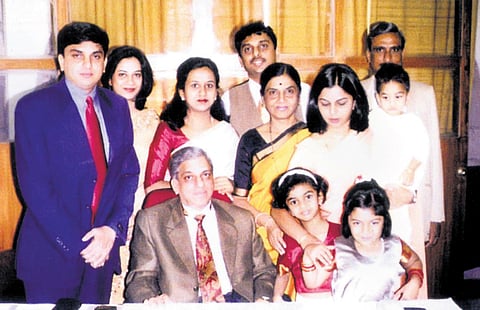

BENGALURU: From travelling on a bullock cart to school, 32km from home, to pursuing law in a defunct prison, to embarking on a journey and becoming a judge of India’s apex court, Justice Shivaraj V Patil is a man made of sheer determination and integrity. Over the last 43 years spent in the public eye, Justice Patil brought honour to all the positions he held, be it principal in the college where he studied, an advocate in the High Court, judge in various other courts, Chief Justice of the Rajasthan High Court, and ultimately as a judge in the Supreme Court. However, his journey to attain this stature was a challenging one, filled with many life lessons and several hard-earned victories.
In his autobiography which will be released on January 21, ‘Time Spent and Distance Travelled’, Patil takes the readers on a conscientious journey and illustrates how one can overcome adversity with perseverance. In five broad chapters, the former judge talks about his early years, legal career trajectory, productive retirement, blessed family and memorable moments throughout his lifetime, spent with peers, gurus and grandchildren.
With limited resources and being born into a humble family of three sisters in Gulbarga (now Kalaburagi), Patil explains how Devadurga taluk of Raichur district was the most backward region of the Hyderabad-Karnataka region. His village, Mandakal, was the poorest of all and lacked amenities. It did not have electricity until the 1970s, and children often studied under a kerosene lantern in the late hours.
In his prologue, he talks about embracing hard work, integrity and humility as qualities. Along with these, divine grace guided him in life. With his unwavering commitment to succeed, Patil wore only one shirt for six months when he was in Grade 7. He diligently washed it at night and wore it the next morning, remembering and following his father’s principles. Some days, he didn’t even have enough to fill his stomach.
Patil’s autobiography is as raw as it gets. “I mention all these (my struggles) not to boast about my success but to illustrate that our ambitions need not be limited by the circumstances of our birth. I offer my life story as a humble road map for those who might find it useful,” he writes. He adds that the legal fraternity would find it particularly useful to read about his conduct with clients, colleagues and litigants in court, and cases that he heard.
In his 400+ pages of memoirs, he notes down 10 commandments that would help new judges at the cusp of their careers. A few that stood out were, ‘To be a good judge, one must first be a good human being’, ‘Use technology but don’t become its slave; don’t surrender your creativity, innovation and original thinking’ and ‘Your oath is your religion, be true to it; your conscience is your watchman, obey it’.
Shivamurthy Shivacharya Mahaswamiji of Sri Taralabalu Jagadguru Brihanmath, Sirigere, was amazed by the artistic mind of Justice Patil. One noticeable aspect of the latter was his suggestion to the designer of his biography. He proposed that the cover page of the book should include two images -- the bullock cart at the bottom and the edifice of the Supreme Court of India at the top. “They figuratively cover his life achievement, from a poor village boy who went to school seated in a bullock cart to become an esteemed judge. The entire contents of the book are covered by these two images at a glance,” says Shivamurthy Mahaswamiji. He adds that Patil climbed his judicial career step by step.
Post his retirement from the SC, Patil contributed significantly to the National Human Rights Commission as chairman, leading a committee for the Prevention of Child Marriage Act, 2G Spectrum, identifying lapses in the allocation of 2G spectrum to telecom operators, and Karnataka Lokayukata in August 2011.
MN Venkatachaliah, former Chief Justice of India, describes Patil’s book as a “difficult personal chronicle” and a “document particularly marked by the absence of the parade of ego that most autobiographies exhibit”. He adds that Patil’s career was shaped by two significant events in his personal life -- one was “God-ordained” when he shifted his law practice from Kalaburagi to Bengaluru. He decided the same on January 4, 1979, at Shree Sharanabasveshwara Temple and news of becoming a judge was also received in the same shrine. The other significant decision was when he declined the invitation from from then chief minister Veerendra Patil to contest the assembly elections from Devadurg legislative constituency.
“The Indian Judiciary had thus this unique gift of a noble and learned judge,” says the former CJI. He concludes by saying that he hopes someday, someone will make a list of the best judicial autobiographies, and the one written by Justice Shivaraj Patil will find its place in it.
Having garnered multiple accolades over the decades, the 84-year-old says he was born in the 20th century and is living in the 21st century, acting as a bridge between the two. He wishes to continue adapting to the changes and never stop learning.
The autobiography will be released on January 21 in Bengaluru, in the presence of Jagadguru Dr Shivamurthy Shivacharya Mahaswamiji, Jagadguru Shree Shivaratrideshikendra Mahaswamiji, Justice MN Venkatachalaiah and Chief Guest Justice RF Nariman